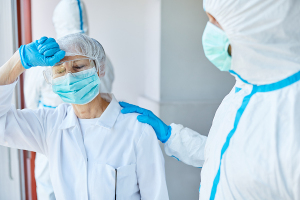by
John R. Fischer, Senior Reporter | September 18, 2020

COVID-19 has left oncologists with a huge backlog of cases and feelings of stress
Cancellations and delays in cancer treatment due to COVID-19 have created huge backlogs for oncologists, who have increasingly experienced high levels of burnout since the start of the pandemic.
These claims were made in a number of independent studies presented this month at the ESMO Virtual Congress 2020, where their authors each discussed the pressures the outbreak has placed on healthcare systems worldwide.
“There is a risk that the diagnosis of new cancer cases will be delayed, and that more patients will be diagnosed at a later stage of their disease,” Dr. Guy Jerusalem, an author of one of the studies who works at Centre Hospitalier Universitaire Sart Tilman in Belgium, said in a statement.



Ad Statistics
Times Displayed: 46200
Times Visited: 1302 Ampronix, a Top Master Distributor for Sony Medical, provides Sales, Service & Exchanges for Sony Surgical Displays, Printers, & More. Rely on Us for Expert Support Tailored to Your Needs. Email info@ampronix.com or Call 949-273-8000 for Premier Pricing.
Jerusalem and his colleagues questioned oncology centers in 18 countries and found that among cancer treatments, surgery was the most likely to be cancelled or delayed (in 44.1% of centers), followed by chemotherapy (25.7%) and radiotherapy (13.7%). An earlier end to palliative care was also observed in 32.1% of centers. More than 60% reported clinical activity to have dropped at the peak of the pandemic, while nearly two-thirds (64.2%) saw undertreatment as a major issue and 37% expected significant reductions in clinical trials this year.
Another study from April of 356 cancer centers across 54 countries found 88% had trouble providing care throughout the pandemic. One issue was patients and staff contracting COVID-19, which affected 54% and 45%, respectively. More than half (55%) reduced services preemptively, while others were forced to do so after being overwhelmed by the situation (20%); or because they were short of personal protective equipment (18%), staff (18%) and medicines (9.8%).
This led to more than one in 10 patients missing at least one cycle of treatment in 46% of centers, with some estimating that up to 80% of patients were exposed to some harm. More than 80% of centers (83.6%) implemented virtual clinics and 93% implemented virtual tumor boards to address this issue, with over half of respondents suggesting that they would continue to use both after the pandemic. In addition, 76% of centers performed routine tests in labs close to patient homes and 68% shipped medication to patients to continue treatments.
"The detrimental impact of COVID-19 on cancer care is widespread, with varying magnitude among centres worldwide,” said study author Dr. Abdul-Rahman Jazieh of King Abdulaziz Medical City in Saudi Arabia, in a statement. “The pandemic has impacted healthcare systems globally, interrupting care and exposing cancer patients to significant risks of being harmed."

